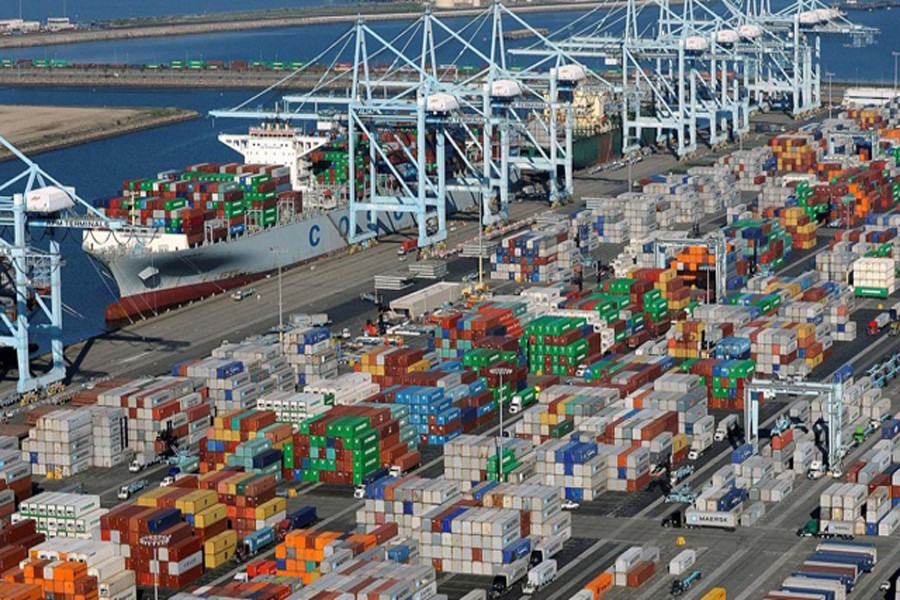US President Donald Trump announced hefty tariffs on $50 billion of Chinese imports on Friday as Beijing threatened to respond in kind, in a move that looks set to ignite a trade war between the world's two largest economies, reports Reuters.
Trump, whose hardline stance on trade has seen him wrangle with allies, said in a statement that a 25 per cent tariff would be imposed on a list of strategically important imports from China. He also vowed further measures if Beijing struck back.
"The United States will pursue additional tariffs if China engages in retaliatory measures, such as imposing new tariffs on United States goods, services, or agricultural products; raising non-tariff barriers or taking punitive actions against American exporters or American companies operating in China," Trump said in a statement.
Earlier on Friday, China vowed to do just that, saying it would strike back, just hours before Trump's statement. Trump has already said the United States would hit another $100 billion of Chinese imports if Beijing retaliated.
Washington and Beijing appeared increasingly headed toward a trade war after several rounds of negotiations failed to resolve US complaints over Chinese industrial policy, market access and a $375 billion trade gap.
"If the United States takes unilateral, protectionist measures, harming China's interests, we will quickly react and take necessary steps to resolutely protect our fair, legitimate rights," Chinese Foreign Ministry spokesman Geng Shuang told a regular daily news briefing.
Trump's initial list included 818 products worth $34 billion in Chinese goods. The remainder of the $50 billion is still to be decided.
Trump has triggered a trade war with Canada, Mexico and the European Union over steel and aluminium and has threatened to impose duties on European cars.
Washington has completed a second list of possible tariffs on another $100 billion in Chinese goods, in the expectation that China will respond to the initial US tariff list in kind, sources told Reuters.
China has published its own list of threatened tariffs on $50 billion in US goods, including soybeans, aircraft, and autos, and has said it would hit back if Washington followed up with further measures.
Beijing and Washington have held three rounds of high-level talks since early May that have yet to yield a compromise. Trump has been unmoved by a Chinese offer to buy an additional $70 billion worth of US farm and energy products and other goods, according to people familiar with the matter.
"The threshold to come to a consensus or a compromise seems high," Tai Hui, chief market strategist for Asia-Pacific at J.P. Morgan Asset Management wrote in a note.
Renewed worries about an escalating trade conflict sent shares in Chinese telecoms gear maker ZTE Corp tumbling on Friday. The company has lost 30 percent of its market value since resuming trade this week.
ZTE last week agreed to pay a $1 billion fine to the US government to end a crippling supplier ban imposed after it broke an agreement to discipline executives who conspired to evade US sanctions on Iran and North Korea.
Trump's revised tariff list may exclude some consumer items from an earlier proposal to focus more on goods related to Beijing's "Made in China 2025" program, according to a Eurasia Group report.
The "Made in China 2025" initiative is aimed at accelerating China's prowess and narrowing its competitiveness gap with the United States and other industrial powers in key technologies such as robotics and semiconductors.
While China has in recent months made incremental market-opening reforms in industries for which critics in the foreign business community say they were already planned, it has shown no inclination to yield on its core industrial policies.
"US-China trade tensions will be long-lasting," Yifan Hu, regional chief investment officer and chief China economist at UBS Wealth Management, told a briefing in Beijing.
"The trade skirmish is not just about the trade deficit and exchange rates, but about the rules of the game, market openness and intellectual property. It is also about values, governance and geopolitical disagreements," she said.


